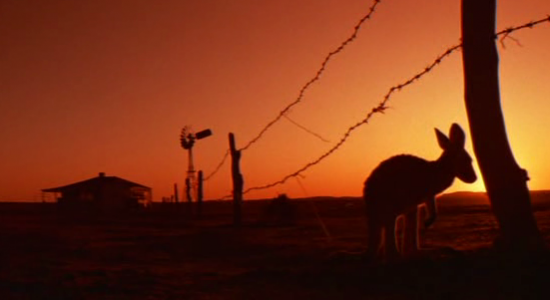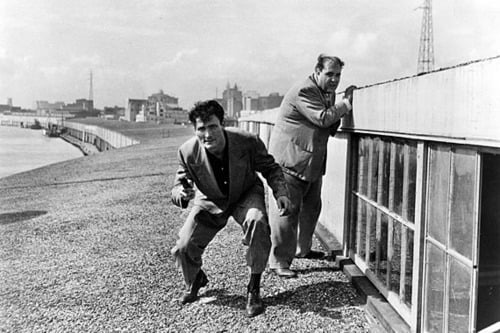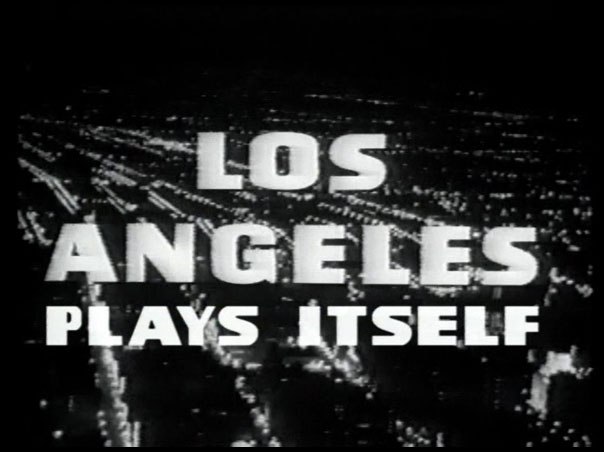
Australia may not have an overabundance of horror films but they do have a rich history within the genre ranging from lowbrow slashers to moody thrillers and outrageous horror comedies. The recent success of the acclaimed documentary Not Quite Hollywood has shed light on a much overlooked aspect of Aussie genre filmmaking. Although horror movies have remained popular in Australia since the early part of the 20th century, it was in the 1970s, that feature film production became increasingly viable. After being nearly non-existent for two decades, a number of prominent filmmakers began to develop a film movement that would eventually see the successes of such films as Mad Max and The Last Wave. It was during this time that Australian cinema as a whole experienced resurgence due to increased governmental funding and eventually gave way to what international film critics termed the “Australian New Wave”.
This period often called the “Golden Age of Australian cinema” deliberately broke all social taboos in the quest to find a recognizable Australian cinematic identity. These films exploited Australian stereotypes and aspects of Australian culture, and utilized Australia’s natural, untamed environments to their advantage. The isolation of the undeveloped Outback would go on to play a major part in Australian horror and action movies and ultimately all of these characteristics would allow these films to obtain audiences overseas while keeping the Ozploitation films distinctly Australian. Here is a list of some of the best Horror films to come out of this movement.
The Long Weekend
Directed by Colin Eggleston
 A very well executed and innovative film for the time, Long Weekend marked the beginning of a continuous run of good Australian horror films, penned by Everett De Roche, including Patrick (1978), Roadgames (1981) and Razorback (1984). This good old fashioned, very tense thriller doesn’t rely on the usual standard shock strategy to deliver its thrills but ultimately guarantees to leave most viewers with goose bumps. Director Eggleston never stages scenes outright but chooses to let the regular course of action dictate what happens to the dysfunctional couple, and instead of the usual setups for suspense, he holds off on delivering an obvious climax.
A very well executed and innovative film for the time, Long Weekend marked the beginning of a continuous run of good Australian horror films, penned by Everett De Roche, including Patrick (1978), Roadgames (1981) and Razorback (1984). This good old fashioned, very tense thriller doesn’t rely on the usual standard shock strategy to deliver its thrills but ultimately guarantees to leave most viewers with goose bumps. Director Eggleston never stages scenes outright but chooses to let the regular course of action dictate what happens to the dysfunctional couple, and instead of the usual setups for suspense, he holds off on delivering an obvious climax.
Long Weekend tops the list of nature vs. man films but is also steeped in the mid-70s statements environmentalism hinting at a broader ecological agenda with mention of nuclear testing and oil exploration.
The small cast is solid despite the minimal amount of dialogue. The sound design is carefully layered while gradually building in force until it hits a frantic fever pitch amplified to an explosive volume, and the camera work by cinematographer Vincent Monton lends to the realistic feel of the film with voyeuristic documentary-quality shots of the outback surroundings.
Not a typical horror film in the standard sense but this small masterpiece is a must see for its slow, eerie style & care in building atmosphere. Should go down well with fans of 70s fare.
Patrick
Directed by Richard Franklin
 Patrick was not only a pivotal film and a commercial success but it was nominated in three categories, including Best Film, at the 1978 AFI Awards and director Richard Franklin took home the Best Director prize at the prestigious Sitges Fantasy Film Festival in Spain.
Patrick was not only a pivotal film and a commercial success but it was nominated in three categories, including Best Film, at the 1978 AFI Awards and director Richard Franklin took home the Best Director prize at the prestigious Sitges Fantasy Film Festival in Spain.
A truly original screenplay where it’s villain remains in a comatose for the entire film. Everett De Roche’s script is surprisingly vivid and punchy; developing its characters well beyond your usual fright-flick archetypes and Richard Franklin’s direction is elegant and suspenseful, relying on mood and atmosphere rather than blood and gore.
The strong cast includes some of Australia’s finest actors, from Julia Blake as the mastiff of a matron to Robert Helpmann as the dangerous doctor. As the titular character, Thompson is utterly mesmerizing on screen despite the fact that he doesn’t utter a single word and Susan Penhaligon who plays the feisty nurse pulls off a rather difficult act of looking convincing while having a conversation with a comatose patient.
Road Games
Directed by Richard Franklin
 Director Richard Franklin has openly confessed that his Road Games is an Alfred Hitchcock derivative, replacing Jimmy Stewart’s apartment view in Rear Window with the open highway windscreen view of an 8-wheel truck transporting the city block into the Australian Outback. At the same time, Road Games could also be viewed as Spielberg’s Duel reversing the roles of the protagonist and antagonists. Like Spielberg, Franklin keeps the nemesis in the shadows while creating a sense of ambiguity and paranoia and does a superb job of maintaining a constant sense of genuine tension. Stacy Keach gives a decidedly entertainingly oddball performance, whose many idiosyncrasies include playing the harmonica, quoting poetry, accompanying classical music on the radio and constantly talking to himself and his pet dingo. Of course as repeated throughout the film, he sees himself as an aristocrat, not a truck driver. The casting of Jamie Lee Curtis (whose mother starred as the famous damsel in distress in Psycho) was also a fundamental point establishing the connection between Road Games and his chief cinematic influence, Alfred Hitchcock.
Director Richard Franklin has openly confessed that his Road Games is an Alfred Hitchcock derivative, replacing Jimmy Stewart’s apartment view in Rear Window with the open highway windscreen view of an 8-wheel truck transporting the city block into the Australian Outback. At the same time, Road Games could also be viewed as Spielberg’s Duel reversing the roles of the protagonist and antagonists. Like Spielberg, Franklin keeps the nemesis in the shadows while creating a sense of ambiguity and paranoia and does a superb job of maintaining a constant sense of genuine tension. Stacy Keach gives a decidedly entertainingly oddball performance, whose many idiosyncrasies include playing the harmonica, quoting poetry, accompanying classical music on the radio and constantly talking to himself and his pet dingo. Of course as repeated throughout the film, he sees himself as an aristocrat, not a truck driver. The casting of Jamie Lee Curtis (whose mother starred as the famous damsel in distress in Psycho) was also a fundamental point establishing the connection between Road Games and his chief cinematic influence, Alfred Hitchcock.
A deeply unsettling and at times very funny thriller that happens to feature two of the most eccentric chase sequences ever filmed
Next of Kin – 1982
Directed by Tony Williams
 The slow measured pacing may put off some people but if you have the patience to sit it out, Next of Kin offers one of the best payoffs in any of the films mentioned on this list with a thrilling ending and an unforgettable final shot. Next of Kin jumps from a gothic style mystery-thriller with a hint of the supernatural to a full on giallo style third act reminiscent of Mario Bava and Dario Argento. Perhaps influenced by Robert Wise’s supremely terrifying ghost movie The Haunting, Next of Kin is the closest I have seen to matching the atmosphere of The Shining. An absolutely breathtaking distinctive musical score by Klaus Schulze (the German electronic music composer and drummer of the early incarnations of Tangerine Dream) and incredible stylish visual imagery make this a must see.
The slow measured pacing may put off some people but if you have the patience to sit it out, Next of Kin offers one of the best payoffs in any of the films mentioned on this list with a thrilling ending and an unforgettable final shot. Next of Kin jumps from a gothic style mystery-thriller with a hint of the supernatural to a full on giallo style third act reminiscent of Mario Bava and Dario Argento. Perhaps influenced by Robert Wise’s supremely terrifying ghost movie The Haunting, Next of Kin is the closest I have seen to matching the atmosphere of The Shining. An absolutely breathtaking distinctive musical score by Klaus Schulze (the German electronic music composer and drummer of the early incarnations of Tangerine Dream) and incredible stylish visual imagery make this a must see.
Razorback
Directed by Russell Mulcahy
 Russell Mulcahy went onto become a major genre director with his big breakthrough success fantasy film Highlander in 1986, launching a long-running franchise. However three years earlier, Mulchahy and script writer Everett De Roche set out to make their version of Jaws, only replacing the ocean with the outback, and the shark with a giant killer pig.
Russell Mulcahy went onto become a major genre director with his big breakthrough success fantasy film Highlander in 1986, launching a long-running franchise. However three years earlier, Mulchahy and script writer Everett De Roche set out to make their version of Jaws, only replacing the ocean with the outback, and the shark with a giant killer pig.
Razorback falls in the middle ground as far as Man versus Nature films go, and although the plot may be a bit familiar, it successfully blends in a vicious, brainless relentless energy that generates just as many laughs as terror. Mulcahy transforms the desolate outback locations into an eerie shadow-land of surreal imagery, and like Spielberg makes the wise decision to keep his creature off screen for the majority of the movie. Cameraman Dean Semler`s (Mad Max 2) cinematography is exceptional with plenty of odd angles and odd imagery to match this very odd film, and the effects are top notch for it’s time.
Without a doubt this is the strangest film on this list. Razorback combines elements of Jaws and Deliverance in a fairy tale setting that is dripped in blood and guts and accompanied with an electronic score and the popular tunes of such artists as INXS, Duran Duran, and Elton John. You’ve never seen anything quite like it before.



